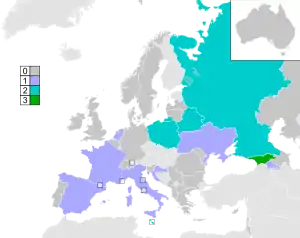List of Junior Eurovision Song Contest winners
The Junior Eurovision Song Contest is an annual contest organized between member countries of the European Broadcasting Union for children aged between 9 and 14 (8 and 15 between 2003 and 2006, 10 and 15 between 2007 and 2015). This junior contest has been broadcast every year since its debut in 2003, and is based on the senior version entitled Eurovision Song Contest, one of the longest-running television programmes in the world since the debut in 1956. The contest's winner has been determined using numerous voting techniques throughout its history; centre to these have been the awarding of points to countries by juries or televoters. The country awarded the most points is declared the winner.


_Gaia_Cauchi_at_rehearsal_2.jpg.webp)
There have been 18 contests, with one winner each year. Twelve different countries have won the Junior Eurovision Song Contest. Seven have won the contest once: Armenia, Croatia, France, Italy, Spain, Ukraine, and the Netherlands. Four have won the contest twice: Belarus, Malta, Poland (first country to win back to back) and Russia. The country with the highest number of wins is Georgia, with three wins. Both Croatia and Italy achieved their wins on their debut participation in the contest. Macedonia is the country with the longest history in the contest without a win having made fifteen appearances since their debut in 2003.
Winning the Junior Eurovision Song Contest provides an opportunity for the winning artist(s) to capitalise on their success and surrounding publicity by launching or furthering their international career. Some artists from Junior Eurovision have progressed later in their careers to participate in national selection finals for the senior Eurovision Song Contest, including Molly Sandén who represented Sweden in 2006 and later took part in the 2009, 2012 and 2016 Melodifestivalen.[1] Nevena Božović represented Serbia in the Eurovision Song Contest 2013 as part of Moje 3 and became the first contestant to compete in the Eurovision Song Contest after competing in the Junior Eurovision Song Contest, where she came third in 2007.[2] The Tolmachevy Sisters are the second contestants to do so, participating (and placing 7th) in the Eurovision Song Contest 2014 after winning the Junior Eurovision Song Contest 2006 with their entry, "Vesenniy jazz" (English: Spring Jazz, Cyrillic: Весенний джаз).[3]
2010, 2012, 2013, 2015, 2016, 2018, 2019 and 2020 are years that a country has won and has hosted the following year's edition.
Winners by year
Winners by country

| Wins | Country | Years |
|---|---|---|
| 3 | ||
| 2 | ||
| 1 | ||
| 2003 | ||
| 2004 | ||
| 2009 | ||
| 2010 | ||
| 2012 | ||
| 2014 | ||
| 2020 |
Winners by language
Since the contest began in 2003, all nations competing must sing in the national language (or national languages) of the country being represented, with at least 60% of the song having to be in the national language/s of the country.
Notes and references
Footnotes
References
- "Junior Eurovision Song Contest 2006 - About Molly Sandén". European Broadcasting Union. Retrieved 10 December 2013.
- Waddell, Nathan (3 March 2013). "Moje 3 win the ticket to Malmö!". escXtra. Archived from the original on 2 May 2013. Retrieved 27 April 2013.
- "Junior Eurovision Song Contest - Russia". European Broadcasting Union. Retrieved 3 July 2014.
| Wikimedia Commons has media related to Winners of the Junior Eurovision Song Contest. |